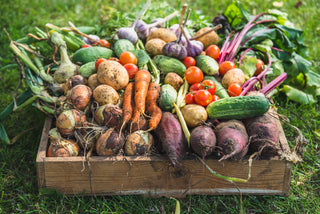In the vibrant world of Australian gardening, the success of your vegetable garden hinges on the early stages—beginning with the careful selection and nurturing of vegetable seedlings. Tailored for both amateur gardeners and commercial vegetable seedling nurseries, this comprehensive guide dives into cultivating robust vegetable seedlings, promising a bountiful harvest. Through meticulous care, precise techniques, and an in-depth understanding of each seedling's needs, we navigate the journey from seed to thriving vegetable plant.
Selecting Quality Seeds and Seedlings
At the heart of vigorous vegetable seedlings lies the quality of the seeds and plant plugs you choose. Opt for organic, non-GMO vegetable seeds from reputable suppliers to ensure genetic purity and the optimal health of your future plants. High germination rates and suitability to your local Australian climate and soil conditions are key considerations.
Understanding Seed Varieties and Types
Selecting seeds for gardening or commercial vegetable seedling nurseries in Australia demands an understanding of the different seed types available. Here's a refined look at hybrid F1, organic, certified organic, open-pollinated, and heirloom seeds, incorporating the relevant keywords:
| Seed Type | Description | Best For |
|---|---|---|
| Hybrid F1 Seeds | The first generation offspring from two different parent plants, crossbred to enhance traits like yield, disease resistance, and uniformity. Not GMOs. Ideal for consistency and vigour in Australian climates. | Commercial vegetable seedling nurseries and gardeners seeking top performance. |
| Organic Seeds | Harvested from plants grown via organic farming practices, excluding synthetic pesticides and fertilisers. Suited for gardeners and commercial nurseries in Australia focusing on organic crop production. | Organic vegetable seedling cultivation. |
| Certified Organic Seeds | Adhere to stringent organic standards. From soil preparation to pest control, these seeds guarantee compliance with organic farming principles. | Strictly organic farming and certified organic vegetable production. |
| Open-Pollinated Seeds | Resulting from natural pollination methods. Seeds can be saved, preserving genetic diversity and adaptability, crucial for organic seed enthusiasts and heirloom vegetable collectors in Australia. | Maintaining genetic diversity in vegetable gardens and nurseries. |
| Heirloom Seeds | Special open-pollinated seeds passed down for generations, valued for their genetic heritage, flavour, and variety. A treasure trove for preserving plant diversity and history in Australian gardens. | Preserving plant diversity and heirloom vegetable collections. |
Clarifying Misconceptions about F1 Hybrids and GMOs
A prevalent misconception equates F1 hybrids with genetically modified organisms (GMOs). However, F1 hybrids result from traditional breeding techniques, facilitating natural pollination under controlled conditions—unlike GMOs, which involve genetic engineering. Celebrated for their robustness, consistent performance, and uniform crop production, F1 hybrids are a reliable choice for specific traits such as improved yield or pest resistance, vital for commercial vegetable seedlings nurseries and organic gardens alike.
Understanding these seed types empowers informed decision-making, tailored to your gardening or commercial nursery goals in Australia. F1 hybrids, in particular, offer distinct advantages for crop uniformity, vigour, and yield, underscoring their role in sustainable and efficient agriculture without the controversies associated with genetic modification.
Choosing the Best Seedlings
The journey to a bountiful garden begins with selecting the right seedlings. Our collection at Quality Plants and Seedlings, available at www.qpseedlings.com.au, features a wide range of vegetable seedlings carefully curated for their vigour, disease resistance, and productivity. When selecting seedlings, consider the specific needs of your garden, including climate adaptability, space requirements, and harvest times.
Soil Preparation: The Foundation of Growth
Preparing your garden soil with rich, organic matter creates an ideal environment for seedlings to flourish. Incorporate compost or well-rotted manure to enhance soil fertility and structure, ensuring your vegetable seedlings receive the nutrients they need for robust growth.
Planting with Precision
The success of your vegetable garden hinges on the correct planting of seedlings. At Quality Plants and Seedlings, we recommend planting seedlings at the correct depth and spacing as indicated on our website. This ensures optimal growth conditions, allowing each seedling enough space to develop without competition for light, water, or nutrients.
Watering Wisely
Water is a vital resource for vegetable seedlings, but its provision must be balanced. Overwatering can lead to root rot, while under-watering stresses plants, hindering their growth. We advocate for regular, consistent watering that keeps the soil moist but not waterlogged, promoting healthy root development.
The Role of Light in Seedling Growth
Light is essential for the photosynthesis process and overall health of your vegetable seedlings. Ensure your garden is positioned to receive ample sunlight throughout the day. In regions with less natural light, consider using grow lights to supplement your seedlings' light intake, encouraging strong and healthy growth.
Nutrition: Feeding Your Seedlings
As your vegetable seedlings grow, their nutritional needs increase. A balanced, slow-release fertiliser, as recommended on our site, can provide the essential nutrients required for sustained growth. Begin with a weaker solution and gradually increase strength as the seedlings mature.
Hardening Off: Acclimatising Seedlings to Outdoor Conditions
Before transplanting seedlings grown indoors or purchased from Quality Plants and Seedlings, it's crucial to harden them off. This process involves gradually exposing seedlings to outdoor conditions over a period of 7-10 days, reducing transplant shock and acclimatising them to their new growing conditions.
Pest and Disease Management
Vigilance in monitoring for pests and diseases is key to maintaining healthy vegetable seedlings. We recommend employing organic pest control methods and practicing regular garden hygiene to minimise infestations and diseases. Early detection and treatment can prevent widespread issues.
Embracing the Gardening Journey
Gardening is a rewarding endeavour that extends beyond the simple act of planting. It's about nurturing, observing, and engaging with the natural world. Through attentive care and a commitment to using quality seedlings from Quality Plants and Seedlings, gardeners can enjoy the fruits of their labour in the form of a vibrant, productive vegetable garden.
In conclusion, the key to a successful vegetable garden lies in the quality of the seedlings, the care they receive, and the passion of the gardener. For those seeking to enhance their gardening knowledge and skills, remember, continuous learning and adaptation are the hallmarks of a proficient gardener.
For more information on cultivating a thriving garden, visit Quality Plants and Seedlings. Here, you'll discover an array of quality seedlings and invaluable gardening insights to ensure the success of your horticultural projects.




